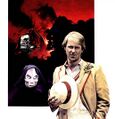Doctor Who and the Visitation (novelisation): Difference between revisions
m (Bot: Cosmetic changes) |
No edit summary |
||
| Line 109: | Line 109: | ||
{{DWN}} | {{DWN}} | ||
{{TitleSort}} | {{TitleSort}} | ||
[[Category:Target novelisations]] | |||
[[Category:Fifth Doctor novels]] | [[Category:Fifth Doctor novels]] | ||
[[Category:The History Collection novels]] | [[Category:The History Collection novels]] | ||
Revision as of 10:09, 23 October 2020
Doctor Who and the Visitation was a novelisation based on the 1982 television serial The Visitation. This was the first Fifth Doctor novelisation to be published.
Publisher's summary
1982 Target Books edition
Tegan, the young air hostess who quite unintentionally became a member of the TARDIS's crew, wants to return to her own time, but when the Doctor tries to take her back to Heathrow Airport in the twentieth century the TARDIS lands instead on the outskirts of seventeenth-century London.
The Doctor and his companions receive a decidedly unfriendly welcome - but it soon becomes clear that the sinister activities of other visitors from time and space have made the villagers extremely suspicious of outsiders.
As a result of the aliens' evil schemes, the Doctor finds himself on the point of playing a key role in a gruesome historical event...
1992 Target Books edition
"CALL YOURSELF A TIME LORD?" TEGAN SHOUTED. "A BROKEN CLOCK KEEPS BETTER TIME THAN YOU!"
The Doctor tries to return Tegan to the Heathrow she left in 1981, but instead the TARDIS lands just outside London in 1666 - the year of the Great Plague.
The Doctor and his companions receive a decidedly cool welcome - and it soon becomes clear that the sinister activities of other visitors from space and time have made the villagers extremely sensitive of outsiders.
And as a result of the aliens' evil schemes, the Doctor finds himself on the point of playing a key role in a gruesome historical event.
This is a novelization by Eric Saward of his own television story, first broadcast in 1982.
2016 BBC Books edition
Trying to get Tegan back to Heathrow in 1981, the Doctor brings the TARDIS to the right place, but over 300 years early - to 1666. They are not the only visitors as Death stalks the local woods, complete with cloak, scythe and a skull like face.
In fact, 'Death' is and android bought by a group of alien Terileptils whose spaceship has crashed. Criminals and fugitives from their own race, they now plan to take over Earth. With Adric and Tegan captured, the Doctor and Nyssa try to deal with the deadly android, and a group of local villagers under the control of the Terileptils.
But even if they succeed, can they prevent the Terileptils from unleashing an even more deadly form of the Black Death?
Chapter titles
Chapter One
Chapter Two
Chapter Three
Chapter Four
Chapter Five
Chapter Six
Chapter Seven
Chapter Eight
Chapter Nine
Chapter Ten
Chapter Eleven
Deviations from televised story
- The Doctor realises who the Terileptils are because they left their tag on their escape capsule; this was not explained in the televised story.
- The Squire is named Sir John.
- Elizabeth is in her room when she spots the Terileptil spacecraft crashing.
- Tegan's references to the events of Kinda while in her room are removed.
Writing and publishing notes
- The first book in the range to feature the use of a photographic cover.
- This was the first title to be referred to in the Target library as book number 74. The number appeared on the cover on a subsequent reprint.
- Dedication: `For Paula, with fondest love'
- Cover Flash reads `A BBC TV PROGRAMME WITH PETER DAVISON AS THE DOCTOR'
- This novelisation was later released as part of The History Collection.
Additional cover images
Unused jacket painting by David McAllister, 1982
1992 edition.
Cover by Alister Pearson2016 BBC Books Edition.
Cover by Chris Achilleos
British publication history
First publication:
- Hardback
- W.H. Allen & Co. Ltd. UK
- Paperback
- Target
Re-issues:
Audiobook
This Target Book was released on 4 October 2012 complete and unabridged by BBC Audio and read by Matthew Waterhouse.
The cover blurb and thumbnail illustrations were retained in the accompanying booklet with sleevenotes by David J. Howe. Music and sound effects by Simon Power.




